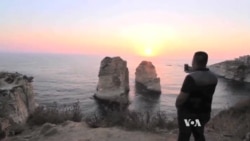Beirut’s waterfront area of Dalieh is one of the few public stretches of coastline in Lebanon.
But that could soon change. This past May, developers came to Dalieh with the hope of building hotels and other properties. Their bulldozers destroyed the homes of some fishermen in the area.
Now, one group is fighting to save Dalieh and reclaim Lebanon’s coast.
An uncertain future
Mahmoud el Ali fears the bulldozers that destroyed the homes of his friends and other fishermen will return. Mr. Ali started fishing at Dalieh at the age of 12. For the past 15 years, he has worked from a shack -- a small, wooden structure -- next to the Mediterranean Sea.
“I spent my lifetime here,” he told VOA. “It is where I earn my money. I am like a fish; if you move me from here, I will die.”
The shack he now shares with other fishermen remains under threat. But there is growing support for people like him.
Resisting development
Activists are battling to keep the coastline open to all people. They organized the Civil Campaign to Protect Dalieh. The group holds protests to spread its message. It has also launched a legal action against the government.
The group says the coastal area includes limestone caves and lagoons, and rare animals and plants. Earlier this year, Lebanon’s ministry of environment announced an order to protect the area.
Abir Saksouk-Sasso is with the Civil Campaign to Protect Dalieh.
“What’s happening in Dalieh is actually happening along the entire coast.”
Source of investment
Dalieh reportedly has several owners. Reports say the family of Rafik Hariri is among them. The late Rafik Hariri was Lebanon’s prime minister and played a major part in the redevelopment of Beirut. He was killed in 2005.
The campaigners like Ms. Saksouk-Sasso are demanding to keep the site completely open. Others have different ideas.
Bilal Hamad is the mayor of Beirut. He told VOA he has seen proposals for the site that included hotels and apartments. Mr. Hamad said he had worked with the owners to ensure the plan included both private development and public access to the coast. He said it would leave almost a sixth of the current area free for the public to enjoy.
Offering an alternative
Those who wish to keep Dalieh open to the general public do not support the private development plans. They say city officials should be doing more to protect the land.
They are prepared to offer another possibility. The Civil Campaign to Protect Dalieh launched a competition for proposals. They called for plans centered on keeping the area public and protecting its ecosystem.
The campaign recently announced the winners. Architect Adib Dada was among them.
“We wanted to show people that there is an alternative to what is being proposed,” Mr. Dada said. He suggested ecotourism and boat tours as ways to make money while still protecting the site’s biodiversity.
“People have lost hope in our institutions, and in our government being able to provide for our rights and not bend to political or financial pressure. We want to give that story of hope,” he said.
Not far from Dalieh is Ramlet al Baida, Beirut’s only public beach. It is also said to be under threat of development. Ms. Saksouk-Sasso says she believes success in Dalieh could lead more people in Lebanon to fight for the public coastline.
I’m Ashley Thompson.
_______________________________________________________________
Words in This Story
bulldozer – n. a powerful and heavy vehicle that has a large curved piece of metal at its front and that is used for moving dirt and rocks and pushing over trees and other structures
shack – n. a small house or building that is not put together well
lagoon – n. an area of sea water that is separated from the ocean by a reef or sandbar
access – n. a way of getting near, at, or to something or someone
ecosystem – n. everything that exists in a particular environment; an ecosystem includes living things, such as plants and animals, and things that are not living, such as rocks, soil, sunlight, and water.





